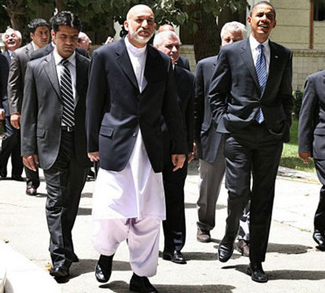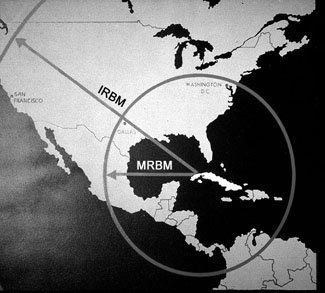FORECAST
Abdullah Abdullah’s decision to pull out of a second round of balloting will elicit sighs of relief in the short term, but it does so at the cost of jeopardizing the long-term chances for the success of NATO’s nation-building project in Afghanistan.
Dr. Abdullah’s decision was in no small way influenced by the heavy odds he faced in any second round of balloting.His efforts to purge the Independent Election Commission of Karzai supporters all met with failure, and his campaign stood on the brink of bankruptcy. In his concession speech, Dr. Abdullah poured doubt on widespread speculation that his withdrawal was the result of backroom dealings between himself and President Karzai. In it, he expressed his belief that any second round would be as fraudulent as the original polls. He also strongly denied any possibility of joining a Karzai-led government.
President Obama now has his resolution to the Afghan election crisis, which he had formerly cited as a precondition for deciding the long-term direction of American policy towards Afghanistan. While the election’s resolution has a thin veneer of constitutional legitimacy, it still falls well short of providing Washington with what it needs in the form of a legitimate partner that can spread its political authority into areas currently under the Taliban’s writ. Although NATO countries are lining up to congratulate President Karzai and afford his shaky appointment a degree of legitimacy, underneath the cheerful words of hope lies a deep reservoir of concern over the future of Afghan democracy.
Nowhere does this concern weigh down more than in Washington, where President Obama is about to embark on a new round of meetings with the Joint Chiefs of Staff on Afghanistan policy. Broadly speaking, he is now faced with three choices: Stay the course, implement the McChrystal surge, or pull troops out and fall back on to a Predator drone campaign to save face.
To stay the course, maintaining current troop levels and implementing new tactical recommendations, would be a politically and strategically risky course of action. At home it would reinforce negative images of President Obama’s ‘dithering’ on the Afghanistan issue. Strategically, while new tactics aimed at winning local trust can and have been successful in the past, there is simply not enough time to wait for positive results to appear.
The prospects for a surge seemed good after the Pakistani Army launched a new push against the Pakistan Taliban in South Waziristan; however the absence of a legitimate political authority in Kabul will cause President Obama to think twice about deepening the American commitment. No matter how many troops America puts on the ground, if there is no credible central government that can establish authority in areas that the Taliban have been routed from, then the campaign could drag on indefinitely. Moreover, a surge is expected to cost at least $20 billion- not an astronomical sum given war expenditures since 2001, but one that’s big enough to factor into a cash-strapped American government’s decision-making process. While this course of action would be politically risky insofar that it shifts ownership of the Afghanistan campaign from Bush’s war to Obama’s, it has the best prospects for military success.
Another option that’s generating a good deal of buzz is the possibility of a troop pullout followed by the waging of a ‘counterinsurgency campaign’ using targeted drone strikes. The logic is that the US military could rely on drones to fight Al Qaeda while the civilian government in Kabul comes to some kind of arrangement with the Taliban. This option is a fast-track to a new Afghan Civil War and perhaps even a failed state, for it naïvely envisions a Western-allied civilian government in Kabul operating parallel to a US drone campaign. It took the CIA 14 months, 16 missile strikes, and between 207-321 additional deaths to kill Baitullah Mehsud in Pakistan. Any government in Kabul that chooses to go against the grain of Afghan nationalism and support mass drone strikes will be a short-lived government indeed.
In keeping with his record of threshing out the long-term implications of foreign policy decisions, it seems most likely that President Obama will green-light a troop surge, though perhaps not as large as McChrystal wants and on a very short leash to produce some quick positive results.
SUMMARY OF EVENTS: October 26 – November2, 2009
NORTH AMERICA
United States
The Pentagon’s top military officer oversaw a secret war game this month to evaluate the two primary military options that have been put forward by the Pentagon and are being weighed by the Obama administration as part of a broad-based review of the faltering Afghanistan war, senior military officials said.
CENTRAL AMERICA & THE CARIBBEAN
Haiti
Haitian lawmakers ousted the government of Prime Minister Michele Pierre-Louis, potentially damaging efforts to lure international investors back to the impoverished Caribbean nation.
Honduras
Honduras’ de facto government has started proceedings at the U.N. court in The Hague to stop Brazil from giving refuge to ousted President Manuel Zelaya in its embassy in Tegucigalpa.
Ousted President Manuel Zelaya said that a U.S.-brokered pact will restore him to power in about a week, ending Honduras’ isolation four months after soldiers flew the leftist leader into exile.
SOUTH AMERICA
Ecuador
An American whose secret recordings have placed him at the center of a $27 billion lawsuit against Chevron in Ecuador is a convicted drug trafficker, records show, throwing another complication into a case already tainted by accusations of bribery and espionage.
Columbia
Colombia has signed an agreement that will expand the US military’s exposure in the South American nation.
Venezuela
Venezuela filed a complaint accusing Colombia’s state security agency of spying in its territory in the latest salvo in a simmering diplomatic spat between the Andean neighbors.
Venezuela said that it had captured Colombian security agents it said planned to destabilize the government, heightening tensions in the ongoing diplomatic row.
WESTERN EUROPE
France
Jacques Chirac will be the first former French president to be tried for corruption, officials said after charges from his years as mayor of Paris returned to taint the twilight of his long career.
United Kingdom
Plans to make British citizens pay more than £4billion a year in taxes directly to Europe emerged.
EASTERN EUROPE
Bosnia
Bosnia is heading for a new civil war as a constitutional crisis threatens to cause the collapse of the political system, the country’s leaders have warned.
MIDDLE EAST
Israel / Palestine
Israel is denying Palestinians adequate access to clean, safe water while allowing almost unlimited supplies to Israeli settlers in the occupied West Bank, human rights group Amnesty International has said.
Four rockets ready to be fired at Israel were discovered by the Lebanese army a day after one was launched into the Jewish state prompting a barrage of retaliatory fire, the military said.
Iran
Iran will accept the broad framework of a UN-brokered uranium deal but wants “very important changes,” state television said, adding Tehran will offer its formal response.
After Yemen accused Iran of sending a ship carrying weapons destined for Yemeni fighters, Iran says documents can be provided to prove the claim is a sheer lie.
Iran told the United Nations nuclear watchdog that it would not accept a plan its negotiators agreed to last week to send its stockpile of uranium out of the country, according to diplomats in Europe and American officials briefed on Iran’s response.
Iraq
Baghdad’s governor blamed negligence or even collusion by the security forces for devastating twin suicide bombings that killed around 100 people in the heart of the capital.
The al-Qaida umbrella group in Iraq has claimed responsibility for the double suicide bombing in Baghdad, in which at least 155 people were killed.
Iraq announced the arrests of dozens of military and security personnel over Baghdad suicide bombings that killed 155 people, trying to calm public outrage at the government’s apparent inability to protect its people ahead of January elections and the pending U.S. troop withdrawal.
EAST ASIA
China
China’s military sought to assure the United States that its arms buildup was not a threat and said Beijing wanted to expand cooperation with the Pentagon to reduce the risk of future conflicts.
Japan
As ministers weigh options over the US Nago military base, the Japanese prime minister says he will thoroughly review the 1960 security treaty between Tokyo and Washington.
SOUTH ASIA
Afghanistan
Ahmed Wali Karzai, the brother of the Afghan president and a suspected player in the country’s booming illegal opium trade, gets regular payments from the Central Intelligence Agency, and has for much of the past eight years, according to current and former American officials.
Ahmed Wali Karzai, the brother of the Afghan president, denied reports that he has received regular payments from the CIA for much of the past eight years.
Hamid Karzai’s government has already begun arrangements to fix the second round of voting in the country’s presidential poll, an election monitor has said.
Bomb attacks killed another eight American soldiers in southern Afghanistan, making October the deadliest month for US forces in their eight-year war against the Taliban.
Taliban militants killed five U.N. foreign staff in an attack on an international guest-house in Kabul, deepening concerns about security for a presidential election run-off.
Afghanistan laid out plans for the November 7 run-off presidential vote in an announcement criticized as insufficient to prevent fraud, a day after a Taliban attack on U.N. staff reinforced concerns about security.
Talks between Afghan President Hamid Karzai and his election opponent, Abdullah Abdullah, broke down, a Western source reported.
Hamid Karzai was re-elected as Afghanistan’s president after a run-off vote was canceled, but he faced stern warnings he will have to work harder to retain the West’s support after a flawed electoral process.
Pakistan
Pakistan killed 19 suspected militants and lost six soldiers in fighting inside a Taliban stronghold close to the Afghan border, the army said as insurgents elsewhere in the frontier region struck back with deadly attacks.
US drone strikes against suspected terrorists in Afghanistan and Pakistan could be breaking international laws against summary executions, the UN’s top investigator of such crimes said.
A car bomb struck a busy market in northwestern Pakistan, killing 100 people—mostly women and children—as visiting Secretary of State Hillary Rodham Clinton pledged U.S. support for Islamabad’s campaign against Islamic militants.
Pakistani forces found a passport of an Islamist militant linked to two hijackers involved in the September 11 attacks during an offensive against Taliban strongholds near the Afghan border, a TV station said.
Sri Lanka
Sri Lanka responded to mounting international criticisms of its wartime conduct by announcing it will appoint a “homegrown” committee to probe alleged human rights abuses.
AFRICA
Guinea
The killing of more than 150 people at an opposition rally by Guinean security forces on September 28 was premeditated, Human Rights Watch said.
African leaders imposed a new barrage of sanctions Guinea’s military rulers, increasingly under fire in the wake of last month’s massacre of scores of opposition supporters.
Zimbabwe
Zimbabwe’s political crisis deepened after the first meeting between President Robert Mugabe and Morgan Tsvangirai since the prime minister’s MDC party boycotted the unity government, an MDC spokesman said.
The United Nations’ special rapporteur on torture said he was being barred entry to Zimbabwe, where he was due to meet Prime Minister Morgan Tsvangirai.




